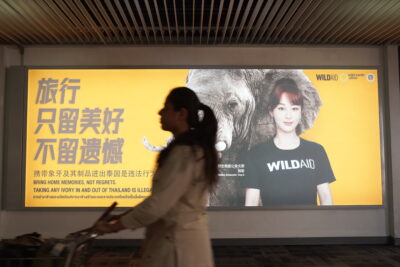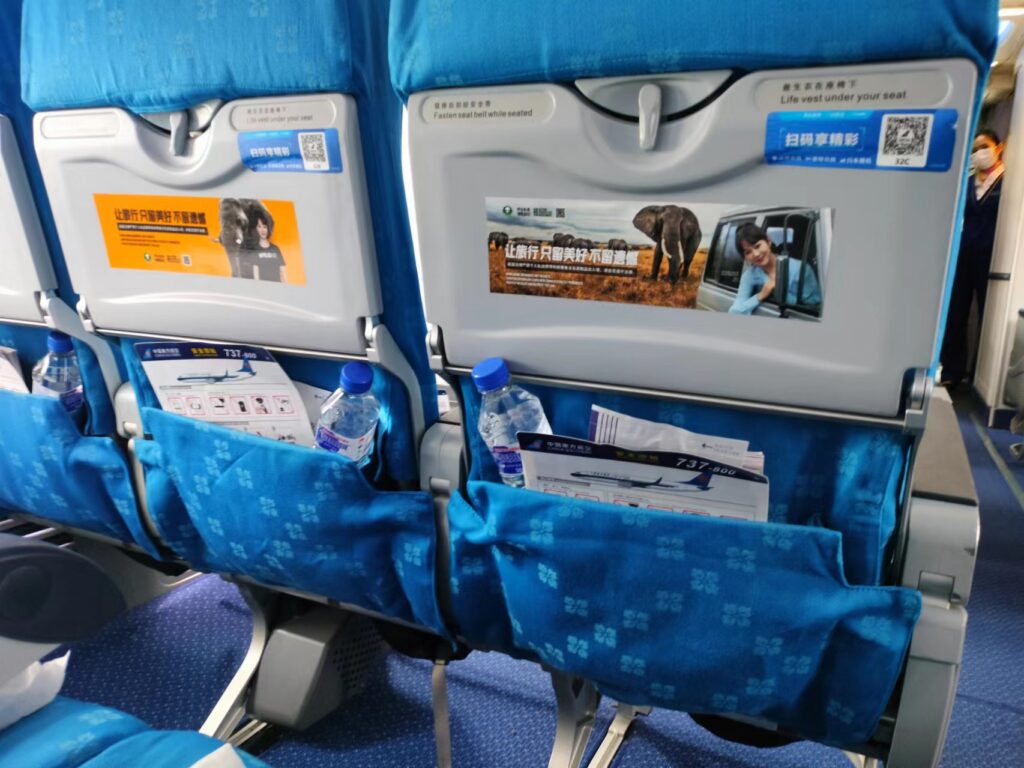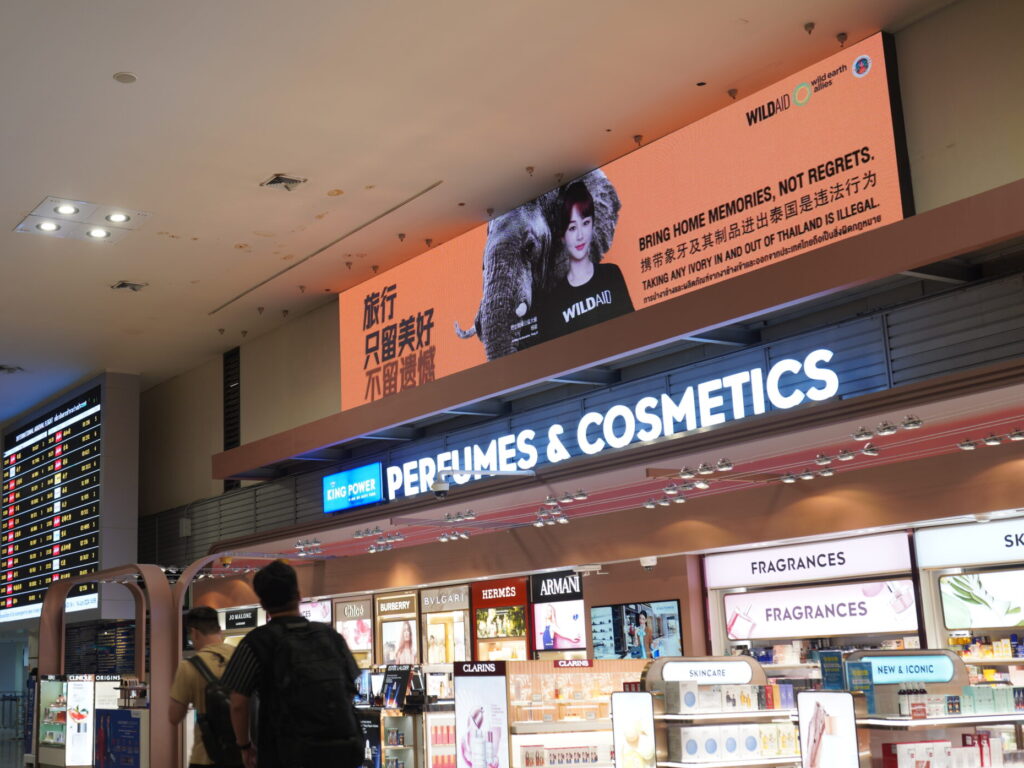
The last decade has brought major strides in combating the ivory crisis, with China’s ban on its domestic ivory market leading the charge. Decrease in demand for ivory products across China has been consistent since the 2017 ban and many other countries around the world have adopted similar bans.
However, demand for ivory products remains strong in certain international markets. While there is ongoing research into various buyer demographics, Chinese travelers have emerged as a notable group driving demand. According to a 2021 GlobeScan and WWF survey, “Regular Overseas Travelers—those who travel outside of Mainland China more than once per year — remain the only group to have increased their rate of purchasing ivory compared to 2017 levels.” Seizures by China Customs confirm this demographic is contributing to the ivory trade, often purchasing ivory souvenirs in regions like Southeast Asia, Japan, and Africa where these products are still sold. Following the resumption of international flights and increased travel, Beijing Customs has stepped up efforts to combat the smuggling of ivory and endangered species. According to widely circulated newspaper Beijing Youth Daily, over 7,800 items related to endangered animals and plants were seized from travelers during the first five months of 2023.
Concurrently, in 2023 and early 2024, Chinese tourists have emerged as one of the largest groups visiting Thailand, which hosts one of the world’s largest ivory markets. The sharp increase in weekly flights between the two countries has raised concerns about ivory purchases. A 2022 WWF report explains that although it is illegal to export ivory from Thailand, the sale of ivory from registered captive elephants remains legal within the country. This allows the travel and tourism sector to continue catering to the demand from tourists, contributing to illicit ivory trafficking across borders.
In response, WildAid launched a campaign aimed at changing the attitudes and behaviors of Chinese travelers visiting Thailand. What made this campaign unique is that it connected with people throughout their travels, from online and offline PSAs in China to physical ads in the airplane itself, to targeted digital ads upon Tencent (one of the largest technology companies in the world) app connection as well as airport placements in Thailand.
Influencing Traveler Behavior in China
On the eve of Earth Day 2023, we debuted a new series of public service announcements (PSAs) with China Wildlife Conservation Association (CWCA) titled, “Bring Home Memories Not Regrets.” In this three-episode PSA series, popular Chinese actress Yang Zi informs outbound travelers that purchasing wildlife products is driving vulnerable species toward extinction and reminds them that it is illegal to bring ivory into China, even as souvenirs.
Over two periods of peak holiday travel, our 434 LED lightbox displays and 572,555 electronic screens covered 207 Chinese cities, reaching nearly 5.3 billion people. Online, 25.3 million people watched the three PSAs with over 1 million posts and 76,000 comments. Associated Weibo hashtags were read more than 1.46 billion times. This campaign generated 51 news articles and won two distinguished awards in the sector: 2023 Beijing International Public Service Advertising Conference, second prize in video category, and the 2023 China Public Welfare Image Festival Popularity Award.
According to our campaign assessment and evaluation, Guangdong, a coastal province of southeast China, was identified as a place of high concern for ivory trafficking. However, it also emerged as one of the top-performing regions for our social media campaign. We’re proud that this campaign effectively reached and influenced a key area of concern for ivory trafficking.
Additionally, we secured a partnership with China Southern Airlines to feature our ads on tray tables on flights from Guangzhou to Thailand for a three-and-a-half-month period starting at Lunar New Year. Given our placement on every tray table and the recorded occupancy rates, our ads reached over an estimated 153,000 travelers.
The culmination of these efforts resulted in increased Chinese travelers’ awareness of the legal and ethical implications of purchasing ivory souvenirs before leaving the country.


Increasing Awareness in Thailand
Since September 2023, WildAid, Wild Earth Allies and Thailand’s Department of National Parks, Wildlife and Plant Conservation (DNP) have been distributing messages from the “Bring Home Memories, Not Regrets” campaign to coordinate both ends of the travel experience, especially around peak travel periods. The campaign materials emphasized that taking any ivory in and out of Thailand is illegal.
As Chinese tourists started arriving in Thailand for their key holiday travel weeks, we launched a social media campaign with these materials on all Tencent apps including WeChat and QQ to reach them upon arrival and while in Thailand searching for tourism-related content. During China’s popular travel holiday Golden Week in October and Lunar New Year in February, our campaign garnered over 1.8 million impressions and 70,000 clicks, with a click-through rate of 4.04%, higher than the industry benchmark of 1.00%. This reach was double our target!
We were also able to secure billboard and digital screen placements at Thailand’s three busiest major International Airports (Don Mueang, Chiang Mai, and Phuket) this summer. Our strategic placements were able to engage travelers at key points, such as baggage claim and customs. In particular, our display at Chiang Mai airport is impossible to miss when arrival passengers make their way to immigration. Thanks to our strong media partnerships, we have been offered the opportunity to extend these placements at no extra cost.
Our mini online poll results from nearly 4,000 participants who saw our campaign on Tencent network revealed an alarming over 30% of respondents have purchased ivory in the past 12 months and/or intend to buy it in the future, underscoring the need to continue to reduce demand within this category of potential consumers.


Strategic Messaging is Shifting Consumer Behavior
In conclusion, our “Bring Home Memories, Not Regrets” campaign strategically targeted key media placements at major Thai airports, a crucial point for engaging Chinese travelers. By delivering our message at the right moment, we maximized visibility when it mattered most. This approach has proven highly effective in reaching people to raise awareness, and we remain hopeful that it will lead to a significant shift in consumer behavior away from purchasing ivory souvenirs as we continue to distribute these messages. We look forward to sharing this campaign’s positive impact soon.
Stay in touch and get the latest WildAid updates.
SIGN UP
